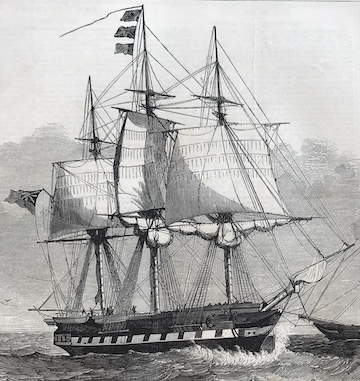I am fascinated by the way in which brief mentions in historical documents can cause individuals to emerge from obscurity. Individuals who, but for this one mention, would be entirely unknown to us. This short example concerns a delinquent seaman named William Harris and his encounter with some entirely anonymous sharks.

William Harris (d. 1846)
William Harris served as a carpenter on H.M.S. Herald while John George Whiffin was clerk. Harris merits a brief mention in Berthold Seemann’s account of Herald’s voyage because he was eaten by sharks in Acapulco harbour.
Apparently, Harris had been shorking his work for nearly a year by pretending to have a crippled arm. This he contrived by "checking the circulation of the blood," presumably be a tourniquet or something similar. When his scheme was discovered, he was imprisoned below decks.
On 17 December 1846, he squeezed through a gun port and lowered himself into the water, intending to swim ashore. When he had gone fifty yards, he called for help, and a boat was dispatched from Herald, but to no avail. "Several sharks were cruising around the ship, and it is probable that they tore him to pieces and devoured him."
Despite dragging the harbour with a ‘creeper’, a small grapnel (W.H. Smyth, The Sailors’ Word Book, 1867), Harris’s shipmates were unable to locate even “a particle” of his body.
This “fearful end of a wretched life” brings William Harris to our attention but raises tantalising questions. Was he really eaten, or was it a ruse to permit his escape? Did he wade ashore to start a new life in Acapulco? Was he really without “a redeeming quality?” What made him avoid work in such a drastic fashion?
We may never know but it’s fun to speculate.
Stories of nineteenth century naval exploits abound with vignettes of men killed in accidents or during combat. For example, there was able-seaman Charles Kennedy who fell overboard from the Herald’s main rigging on 26 October 1850 (Seemann, A Narrative of the Voyage of HMS Herald, vol.2 p.188.). And “a noble-hearted fellow, named Nan Kivell” who was killed by enemy fire on H.M.S. Macedonian on 25 October 1812 (Samuel Leech, Thirty years from Home, 1844, p.87).
They and many like them inhabited a world that is well documented, but at once wholly alien to us now. They possessed skills now redundant and spoke a vocabulary we would be hard-pressed to follow (as a brief look through The Sailors’ Word Book will swiftly reveal). So much knowledge and experience lost.
